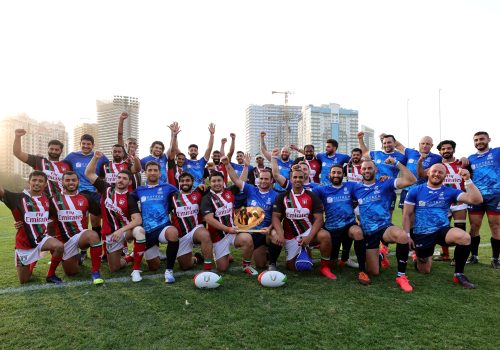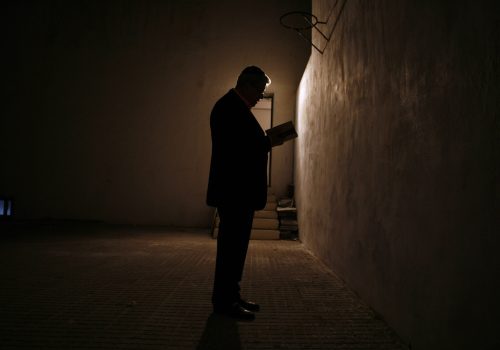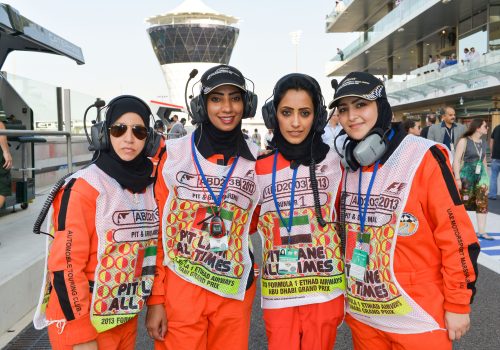What the opening of the Abrahamic Family House Synagogue in the UAE means for the Jewish community and the rest of the world
With great expectations, the Abrahamic Family House, a mosque, church, and synagogue all sharing a multi-faith campus in Abu Dhabi (the capital of the United Arab Emirates (UAE)) is about to make its worldwide debut, opening its doors to the general public on March 1. This inspiring development, which was named after Abraham—the forefather of the three monotheistic religions: Judaism, Christianity, and Islam—is dedicated to the pursuit of peaceful coexistence for generations to come.
Part of that complex is the Moses Ben Maimon Synagogue, inaugurated on February 16 in a series of intimate and public gatherings with government officials, highly-reputed rabbis, and enthusiastic supporters. Mezuzahs have been hung on the venerable doorposts and, for the first time, the growing Jewish community has prayed together in unison in the first purpose-built synagogue in the Middle East outside of Israel in a hundred years.
While the synagogue is integral for the future of Jewish life in the UAE—as well as peaceful coexistence between Jews in the Arab world—it is equally important to see it in the context of what has been occurring in the Gulf state over the past many years, well before the signing of the Abraham Accords in 2020.
In 1971, Sheikh Zayed al Nahyan, a leader of great vision, convened the Arabian Peninsula’s ruling families and created the UAE. The country was built upon his strong fundamental values of charity, equality, generosity, coexistence, and tolerance, and the principles of the founding father have continued to drive the country’s progress.
In the past fifty-two years, the UAE has emerged from its humble desert beginnings into a modern, vibrant metropolis, recognized for its technology, innovation, and architecture. It has been so successful that it has attracted the world, with much of the UAE population compromising of expats representing over two hundred different languages, ethnicities, and religions. This dynamic value system and multicultural canvas create the backdrop for what has emerged more recently.
In 2018, the Dubai “secret synagogue” came to public light with an article published in Bloomberg, revealing a small, tight-knight group of about 150 expat Jews congregating in “The Villa” (the home of one of its former members). While given tacit approval to convene and pray, the Jewish community had no formal authority and kept a very low profile, with most members not revealing their religion, even to their closest colleagues.
Then, in 2019, the Emirati government proclaimed The Year of Tolerance, dedicated to coexistence and religious pluralism. The focal point of 2019 was the visit of Pope Francis—the first-ever papal trip to the Arabian Peninsula. In addition to hosting a papal mass for 135,000 worshippers, the visit included the signing of the Document of Human Fraternity between the Pope and the Grand Imam of Al-Azhar, Ahmad Al-Tayyeb, which jointly declared the adoption of a mutual culture of dialogue as the pathway to respect and peace. On the heels of the visit and the signing of the document came the announcement of the building of the Abrahamic Family House. This opened the door for the Jewish community to be recognized as part of the Abrahamic family in the UAE.
The year was also commemorated by the book, Celebrating Tolerance: Religious Diversity in the United Arab Emirates—including an in-depth profile of the Jewish Community in the UAE, validating it publicly for the very first time. It was also during this year that the Jewish community made a sincere and audacious offer to dedicate a golden Torah to Sheikh Mohammad bin Zayed, the now Emirati president, in honor of his late father, Sheikh Zayed. The making of the Torah and its dedication at the Royal Palace is the subject of an award-winning documentary, Amen.
While 2019 was an exemplary year for Jewish life in the UAE, there was no more transformational event than the UAE’s normalization of ties with Israel and the birth of the Abraham Accords in August 2020. Over the past two years, the Accords have yielded incredible results, including a multi-billion-dollar bilateral trade relationship, a booming tourism industry, and many innovative partnerships in technology, security, and defense. Jews from around the world have moved to the UAE to benefit from its culture and economy, its relative safety and security against antisemitism, and the presence of at least six minyans (quorums for prayer), five kosher eateries, and two nursery schools.
Now, in 2023, the UAE owns and operates the first purpose-built synagogue in the Gulf in a hundred years. And it’s not just any synagogue: it’s the Moses Ben Maimon Synagogue, aptly named after the twelfth-century Sephardic Jewish philosopher, also commonly known as Maimonides or by the Hebrew acronym Rambam. Recognized for his scholarly teachings, Maimonides was also a highly-respected scientist, historian, and philosopher in both the Jewish and Islamic world, making him the ideal personification of what this synagogue truly represents.
First and foremost, the Moses Ben Maimon Synagogue will be the flagship center for Jewish life in Abu Dhabi, and the home away from home for the many other Jewish communities that have flourished since the Abraham Accords. It will host Jewish community events, religious services, and holiday celebrations, as well as Jewish lifecycle events, such as weddings, bar mitzvahs, and bat mitzvahs. It even has a mikvah (a Jewish ritual bath) and an on-site residence for the many rabbis and scholars in residence who are sure to travel through its doors. Before the venue even opened to the public, former assistant to US President Donald Trump, Avi Berkowitz held his wedding there on February 23.
But if the synagogue rises to the occasion of its namesake, it will be much more than the center for Jewish life. It has the potential to be something greater: a global center for pluralism, culture, education, and engagement; a center for interfaith education, research, and engagement; a center that can create links between Jewish, Arab, and Christian communities within the UAE, across Arabia, and around the world. The Moses Ben Maimon Synagogue is not just another synagogue. It’s a synagogue in the UAE, where the motto is “Impossible is possible.” It is a beacon of faith from a Muslim country demonstrating its values of peace and coexistence. It is also a beacon of light at a time when western antisemitism is at an all-time high. Perhaps, most significantly, it is a beacon of peace in the Middle East.
Marcy Grossman is a nonresident senior fellow with the Atlantic Council’s Rafik Hariri Center and Middle East Programs and former Canadian ambassador to the United Arab Emirates.
Further reading
Thu, Jan 26, 2023
People-to-people exchanges matter. They’re integral to nurturing the Abraham Accords.
MENASource By Richard LeBaron
This piece identifies some of the issues involved in creating a strong framework for a vital “Abraham Exchanges” program and proposes a few ideas on how to get it off the ground.
Fri, Dec 2, 2022
Morocco is building bridges to connect its youth with its Moroccan Jewish cultural heritage. Here’s how.
MENASource By El Mehdi Boudra
Morocco’s continuation of decades-long efforts to safeguard the Moroccan Jewish heritage is integral to combating extremism and hatred and fostering interreligious dialogue.
Tue, Feb 7, 2023
The UAE and Israel have a history of strong female leadership. Women must take substantial roles in the next phase of the Abraham Accords.
MENASource By Marcy Grossman
To have a sustained and enduring peace in the region after the signing of the Abraham Accords, women must also be equally included and reflected in policy-making, decision-making, and programming.
Image: A man takes a picture inside a synagogue during a media tour at the Abrahamic Family House, an interfaith complex that contains a synagogue, a church and a mosque, in Abu Dhabi, United Arab Emirates, February 21, 2023. REUTERS/Amr Alfiky


